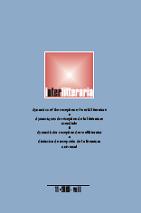Interlitteraria
Interlitteraria
Publishing House: Tartu Ülikooli Kirjastus
Subject(s): Language and Literature Studies, Literary Texts
Frequency: 1 issues
Print ISSN: 1406-0701
Status: Active
- 1998
- 1999
- 2000
- 2001
- 2002
- 2003
- 2004
- 2005
- 2006
- 2007
- 2008
- 2009
- 2010
- 2011
- 2012
- 2013
- 2014
- 2015
- 2016
- 2017
- 2018
- 2019
- 2020
- 2021
- 2022
- 2023
- 2024
- Issue No. 3/III
- Issue No. 4/IV
- Issue No. 5/V
- Issue No. 6/VI
- Issue No. 7/VII
- Issue No. 8/VIII
- Issue No. 9/IX
- Issue No. 10/X
- Issue No. 11/XI
- Issue No. 12/XII
- Issue No. 13/XIII
- Issue No. 1/XIV
- Issue No. 2/XIV
- Issue No. 1/XV
- Issue No. 2/XV
- Issue No. 1/XVI
- Issue No. 2/XVI
- Issue No. 1+2/XVII
- Issue No. 1/XVIII
- Issue No. 2/XVIII
- Issue No. 1/XIX
- Issue No. 2/XIX
- Issue No. 1/XX
- Issue No. 2/XX
- Issue No. 1/XXI
- Issue No. 2/XXI
- Issue No. 1/XXII
- Issue No. 2/XXII
- Issue No. 1/XXIII
- Issue No. 2/XXIII
- Issue No. 1/XXIV
- Issue No. 2/XXIV
- Issue No. 1/XXV
- Issue No. 2/XXV
- Issue No. 1/XXVI
- Issue No. 2/XXVI
- Issue No. 1/XXVII
- Issue No. 2/XXVII
- Issue No. 1/XXVIII
- Issue No. 2/XXVIII
- Issue No. 1/XXIX
- Issue No. 2/XXIX
Articles list
{{ article.TitleOriginalLanguage }}
{{ article.TitleOriginalLanguage }}
({{ article.TitleEnglish }})
- Publication: {{ article.Publisher }} ({{ article.Issue }})
- Author(s): {{ article.Authors }}
- Contributor(s): {{ article.Contributors }}
- Language: {{ article.Language }}
- Subject(s): {{ article.Subjects }}
- Issue: {{ article.Issue }}
- Page Range: {{ article.PageRange }}
- No. of Pages: {{ article.NumberOfPages }}
- Keywords: {{ article.Keywords }}
- Summary/Abstract: {{ article.SummaryAbstract }}
- Price: {{ common.currency(article.Price) }}
Short Description
At the end of 1994 the Estonian Association of Comparative Literature (EACL) was founded in Tartu, the old and famous Estonian university town. A few months after, the EACL was admitted to the ICLA (International Comparative Literature Association), global organization uniting some 5000 literary scholars world-wide. At present the EACL has more than forty members, with its centre at the Chair of Comparative Literature of Tartu University. To create a forum for an exchange of literary-philosophical and cultural-philosophical ideas between Estonia and the world, in 1996 Interlitteraria, the annual international magazine of the EACL, was founded. Its purpose is to channel new literary-philosophical ideas from the international area to Estonia and, at the same time, to spread knowledge about Estonian literary and philosophical studies outside Estonia, as well as to let the wider world have some idea of Estonian literature itself which, because of the language barrier, has belonged traditionally to the majority of "silent" literatures of the world, unjustly ignored by the area of the dominant Western languages. To overcome, at least in part, the above-said language barrier, Interlitteraria publishes articles in four major international languages: English, Spanish, French and German. In practice, English has been overwhelming. However, the presence itself of Spanish, French and German in Interlitteraria should be understood as a symbol of its dialogical openness and its attempt to overcome the supremacy of a linguistic monopoly. Being published in a minority country in a European "border'' zone or periphery, Interlitteraria aspires to be a point of contact between East and West, North and South. It would like to function as a genuine mechanism of dialogue, as the late head of the Tartu School of Semiotics Yuri M. Lotman (1922-1993) would characterize the essence of any "border''. During the first five years of its existence, Interlitteraria has published, all in all, 112 articles by scholars from 28 countries. It has represented discourses coming from the West (France, USA, Spain, Italy, Germany), Northern Europe (the Scandinavian and Baltic countries, including Estonia itself), Central Europe (Hungary, Romania), Eastern Europe (Russia), as well as "exotic'' zones, as far from the West as India, China, Japan, Corea, Mexico or Colombia. The next issue of Interlitteraria (6, 2001) will complement importantly the Austral vision, including for the first time contributions from the continent of Africa. Interlitteraria will be open to all serious discussions, from a comparative point of view, on literary and cultural processes that stir, both undermining and balancing, the world of our days. ISBN 9985-56-149-X

